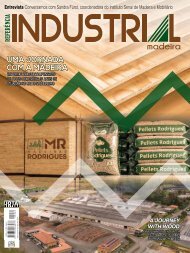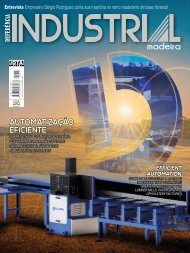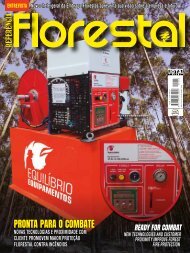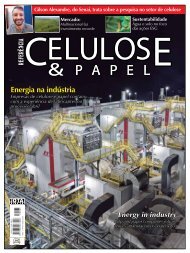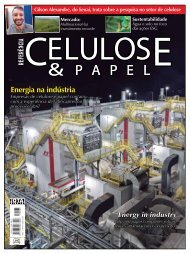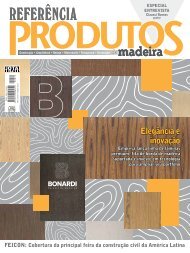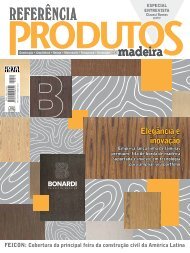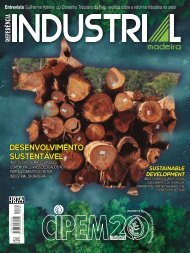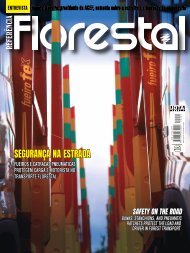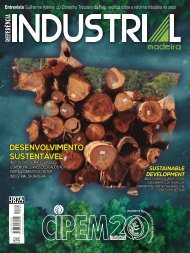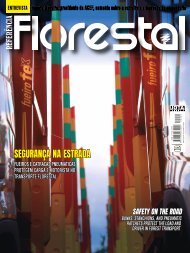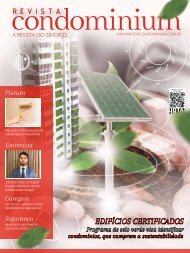Create successful ePaper yourself
Turn your PDF publications into a flip-book with our unique Google optimized e-Paper software.
ENTREVISTA<br />
>> Como foi sua chegada ao SFB?<br />
Fui muito bem recebido por toda a equipe que é muito competente,<br />
embora ainda pequena para o atendimento dos seus<br />
objetivos.<br />
>> Quais os maiores desafios na gestão do SFB?<br />
O primeiro desafio é reestruturar o SFB, uma vez que a administração<br />
anterior adotou um modelo de gestão, no qual<br />
equiparou o SFB a uma Secretaria do MAPA (Ministerio da<br />
Agricultura, Pecuária e Abastecimento). Desta forma, todas as<br />
atividades consideradas meio como consultoria jurídica, ouvidoria<br />
e tecnologia da informação, que são cruciais para o funcionamento<br />
autônomo do SFB, foram extintas e suas funções<br />
transferidas para respectivas unidades do MAPA. Já em relação<br />
às atividades finalísticas, o desafio é a volta da priorização da<br />
gestão de florestas nativas com foco em: aumentar a oferta de<br />
produtos oriundos do manejo florestal, incluindo o aumento<br />
da área em concessões florestais; promover a recuperação<br />
florestal para a conservação e ou manejo sustentável; apoiar a<br />
regularização ambiental em imóveis e posses rurais, conforme<br />
estabelecido no Código <strong>Florestal</strong>.<br />
>> O SFB é responsável pelo SICAR (Sistema Nacional de Cadastro<br />
Ambiental Rural). Quais as principais ações do SFB para<br />
o fortalecimento do SICAR?<br />
O SICAR está construído para atender todas as etapas da regularização<br />
ambiental rural. Desde janeiro de 2023, o SFB vem<br />
adotando um conjunto de medidas buscando fortalecer os aspectos<br />
de segurança, integridade e transparência dos dados e<br />
das informações contidas no SICAR, bem como, aperfeiçoando<br />
e desenvolvendo novas funcionalidades com o objetivo de robustecer<br />
e automatizar o processo eletrônico de regularização<br />
ambiental. Algumas mudanças devem ocorrer devido a transferência<br />
da gestão do CAR (Cadastro Ambiental Rural) em nível<br />
federal, para o Ministério da Gestão e da Inovação em Serviços<br />
Públicos.<br />
>> Como foi sua experiência na WWF-Brasil e no FSC Brasil?<br />
Ao longo da minha carreira, tenho acumulado experiências<br />
trabalhando em projetos e iniciativas que penso serem úteis<br />
para o trabalho desenvolvido pelo SFB. No WWF apoiei, por<br />
exemplo, um projeto comunitário na RESEX (Reserva Extrativista)<br />
Chico Mendes, que exportava castanha do Brasil para uma<br />
empresa dos EUA, um projeto comunitário na RESEX Cajari para<br />
produção de palmito de açaí e polpa de açaí para o mercado<br />
nacional, e o desenvolvimento e disseminação de um manual<br />
para manejo florestal na Amazônia, liderado pelo IMAZON.<br />
Quando voltei ao Brasil para fundar o WWF-Brasil notei a demanda<br />
do setor florestal para separar a produção oriunda do<br />
manejo florestal da madeira proveniente de desmatamento. A<br />
certificação independente e reconhecida internacionalmente<br />
parecia ser a solução. Como já havia participado da criação do<br />
FSC mundial, promovi junto ao setor privado, ONGs sociais e<br />
ONGs ambientais, a criação do FSC Brasil, o qual presidi pelos<br />
primeiros 7 anos. Foi uma experiência que demonstrou que<br />
How were you received at the SFB?<br />
I was very well received by the team, which is very competent,<br />
although still small, for fulfilling its objectives.<br />
What are the most significant challenges in managing the<br />
SFB?<br />
The first challenge is restructuring SFB since the previous<br />
administration adopted a management model that equated<br />
the SFB as a Secretariat of the Ministry of Agriculture, Livestock,<br />
and Supply (Mapa). Thus, all activities, such as legal<br />
advice, ombudsman, and information technology, which<br />
are crucial for the autonomous functioning of the SFB, were<br />
extinguished, and their functions were transferred to the<br />
respective units of Mapa. Regarding the primary activities,<br />
the challenge is to return to the prioritization of native<br />
forest management with a focus on increasing the supply<br />
of products from forest management, including expanding<br />
the area in forest concessions; promoting forest recovery for<br />
conservation and/or sustainable management; supporting<br />
environmental regularization in rural properties and ownerships,<br />
as established in the Forest Code.<br />
SFB is responsible for the National Rural Environmental<br />
Registry System (Sicar). What are the main actions of SFB<br />
to strengthen Sicar?<br />
Sicar is built to meet all stages of rural environmental<br />
regularization. Since January 2023, SFB has been adopting<br />
measures seeking to strengthen the security, integrity, and<br />
transparency aspects of the data and information contained<br />
in Sicar, as well as improving and developing new functionalities<br />
to enhance and automate the electronic process of<br />
environmental regularization. Some changes must occur<br />
due to the transference of the Rural Environmental Registry<br />
(CAR) management at the federal level to the Ministry of<br />
Management and Innovation in Public Services.<br />
What was your experience at WWF-Brasil and FSC in Brazil<br />
like?<br />
Throughout my career, I have accumulated experience working<br />
on projects and initiatives that I think are useful for the<br />
work developed by SFB. At WWF, I supported, for example,<br />
a community project in Extractive Reserve (Resex) Chico<br />
Mendes, which exported Brazilian ground nuts to a U.S.<br />
company, a community project in Resex Cajari to produce<br />
açaí pulp and palm hearts for the domestic market, and the<br />
development and dissemination of a manual for forest management<br />
in the Amazon, run by Imazon. When I returned<br />
to Brazil to start WWF-Brasil, I noticed a demand from the<br />
Forest-based Sector to separate timber production between<br />
forest management and deforestation. Independent and<br />
internationally recognized certification seemed to be the<br />
solution. As I had already participated in creating the global<br />
FSC, I promoted, with the Private Sector and social and environmental<br />
NGOs, the creation of FSC Brasil, which I chaired<br />
for the first seven years. It was an experience that demon-<br />
74 www.referenciaflorestal.com.br



